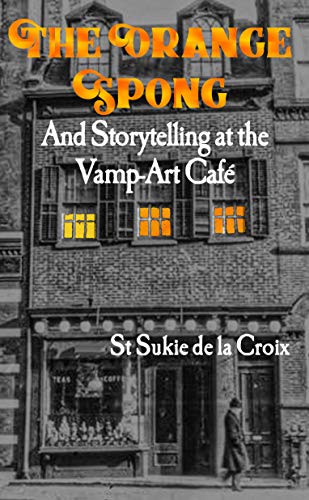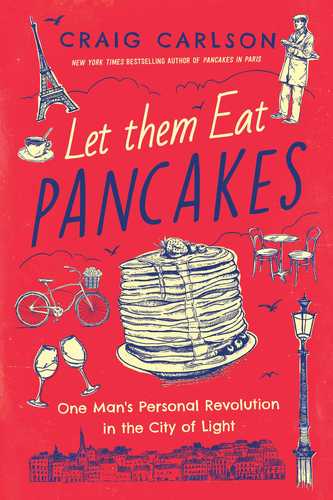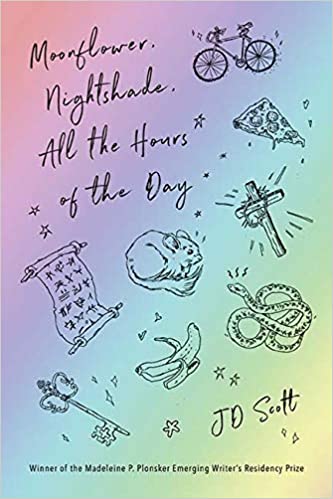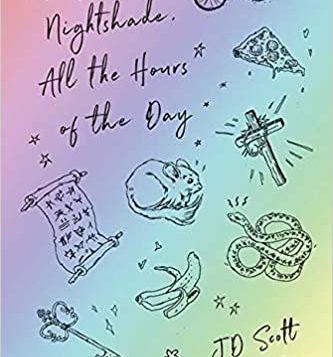 THE ORANGE SPONG
THE ORANGE SPONG
And Storytelling at the Vamp-Art Café
by St Sukie de la Croix
Rattling Good Yarns Press. 104 pages, $14.95
This fantasy novel consists of stories told aloud by a community of harmless “vampires” who don’t feed on blood. These beings relieve mortals of their fear of death by giving them a kind of acupuncture with their fangs. They are immortal immigrants who fled from Britain and Europe to America after the publication of Bram Stoker’s Dracula in the 1890s, which led to widespread misconceptions about their kind. In this sense, they resemble the immigrants who formed the American “melting pot” before and after the turn of the 20th century. Their stories are full of witty historical and literary references. The “vampires” gather in a nightclub in Chicago in 1924, which is also the setting of the author’s previous novel, The Blue Spong and the Flight from Mediocrity. A “spong,” in these novels, seems to be a source of unlimited energy. In the first novel, the “blue spong” was the immortal heart of a hawk owned by Genghis Khan that gave courage to three sisters who discovered their true nature in the diverse cultures of jazz age Chicago. In the current novel, the “orange spong” is “Ra,” the sun.
The author, born in England in 1951, began writing for journals in the fledgling counterculture of the 1960s and gave himself a more colorful name than the one his parents had chosen. When he immigrated to Chicago in 1991, his reputation as a contributor to the earliest LGBT journals came with him. He eventually wrote Chicago Whispers: A History of LGBT Chicago before Stonewall (2012). He has edited three anthologies of LGBT life stories, Tell Me About It 1, 2, and 3, all based on responses to questionnaires posted on-line. His own life story, The Memoir of a Groucho Marxist: A Very British Fairy Tale, appeared in 2018. “The Flight from Mediocrity” would be a good title for both his work and his life.
Jean Roberta
 LET THEM EAT PANCAKES
LET THEM EAT PANCAKES
One Man’s Personal Revolution in the City of Light
by Craig Carlson
Pegasus Books. 336 pages, $27.95
Craig Carlson, who endured a wildly dysfunctional family while growing up in small-town Enfield, Connecticut, near the Massachusetts border, experienced a lot of lucky breaks. He had teachers who believed in him; he took French in high school; and in college (at University of Connecticut) he took his junior year abroad in Paris. After a not-entirely-successful career as a screenwriter and filmmaker in L.A., he went back to Paris with the crazy idea of opening a restaurant—an American restaurant, as its name, “Breakfast in America,” would imply, with some financial backing by friends he’d made in the movie industry. After much searching, he found the perfect location in 2003, and the restaurant did so well that three years later, he opened a second “BIA.” Both are still in operation as of this writing, serving down-home American food to tourists and curious Parisians.
Carlson, who is openly gay, married his partner Julien, enduring endless bureaucracy to do so, though it probably wasn’t any more onerous than what a straight couple would have had to go through. The bigger issue was Carlson’s American citizenship. Though there is perhaps more in this book than one might have expected about French labor law and workers’ rights, such issues are an ever-present concern for a business owner in France. Carlson closes with the reading tour that he and Julien launched for the publication of his first book, Pancakes in Paris: Living the American Dream in France (2016) and the thrill of meeting his now elderly teachers, who had been so kind to him years ago.
Martha E. Stone
 MOONFLOWER, NIGHTSHADE, ALL
MOONFLOWER, NIGHTSHADE, ALL
THE HOURS OF THE DAY: Stories
by JD Scott
Lake Forest College . 236 pages, $16.95
Published as part of the “Plonsker Series” after winning the Madeleine P. Plonsker Emerging Writers Prize, this hard-to-categorize collection by JD Scott is a literate, genre-bending blend of fairy tale and fantasy. When the mixture works (occasionally it doesn’t), it seems effortless and magical. For instance, in one of the collection’s stand-outs. “Chinchilla,” a creature “hard to even see … as real” becomes a metaphor not only for the fragility of gay relationships but also for love in general. Similarly, in “Night Things,” a writer at a retreat in the Everglades, initially fearful of a strange neighbor he suspects of being a witch, discovers hidden sympathies that ultimately reveal his previous failings as a writer. The subtlety with which both of these themes emerge is surprising and exhilarating. Scott’s prose is both adept and poetic: a woman’s eyes are “oceancold”; a drunk shouts in “vodka glossolalia.” In the sly, coming-of-age novella that ends the collection, the entire world has become a mall, while the narrator tries to ignore the numerous magical and literal archetypes that keep attempting to lure him away from his job. Writes the author: “Surely that can’t be real, but I’ve heard about magic, how it could destroy our stores, just like that, if you let it in.”
Dale Boyer






